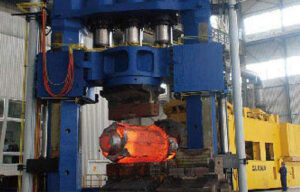Hot work tool steel is a class of materials known for their exceptional heat resistance, wear properties, and toughness. These steels play a crucial role in various industrial processes, including forging. In the forging industry, where extreme temperatures and mechanical stresses are commonplace, hot work tool steel is the material of choice. This comprehensive article explores the applications and benefits of using hot work tool steel in forging, shedding light on why it is an indispensable material for this critical manufacturing process.
1. Introduction
Hot work tool steel is a specialized class of steel alloys known for their ability to perform in high-temperature and high-stress environments. In the forging industry, where extreme temperatures and mechanical forces are part of daily operations, hot work tool steel is an indispensable material.
2. Forging: An Overview
The Forging Process
Forging is a manufacturing process that involves shaping metal through the application of compressive forces. It can be performed using various methods, including hammer forging, press forging, and extrusion forging.
Importance of Material Selection
The success of the forging process relies heavily on the choice of material. Forgings must endure the extreme temperatures and mechanical stresses inherent to the process.
3. Hot Work Tool Steel: Composition and Characteristics
Alloying Elements
Hot work tool steel is engineered with a precise blend of alloying elements, including chromium, tungsten, molybdenum, and vanadium. These elements confer heat resistance, wear resistance, and toughness to the steel.
Heat Resistance and Wear Resistance
Hot work tool steel exhibits remarkable heat resistance, maintaining its structural integrity even at temperatures exceeding 600°C (1112°F). Its wear resistance ensures that molds, dies, and tooling remain durable in abrasive environments.
Toughness
Toughness is a critical property for hot work tool steel in forging. It allows components to withstand the mechanical stresses and impact loads encountered during the forging process.

4. Applications of Hot Work Tool Steel in Forging
Hammer and Press Dies
Hot work tool steel is employed to craft hammer and press dies used in open-die forging. These dies must endure repeated thermal cycling and high mechanical stresses.
Forging Tongs and Tools
Forging tongs and hand tools made from hot work tool steel provide the necessary strength and durability for handling hot metal during the forging process.
Extrusion Tooling
In extrusion forging, hot work tool steel is used for tooling components that shape materials under high temperatures and pressures. The material’s heat resistance and wear resistance are crucial for maintaining precision.
5. Benefits of Hot Work Tool Steel in Forging
Exceptional Heat Resistance
Hot work tool steel can withstand the extreme temperatures generated during the forging process without losing its structural integrity. This property ensures consistent performance and longevity.
Wear Resistance for Longevity
The wear resistance of hot work tool steel extends the lifespan of forging dies, tongs, and extrusion tooling. It prevents premature wear and maintains precision in the manufacturing process.
High Toughness for Endurance
Toughness is paramount in forging, where mechanical stresses and impact loads are prevalent. Hot work tool steel’s high toughness ensures that tools and components endure without fracturing or failing.

6. Challenges and Considerations
Alloy Selection
Selecting the right hot work tool steel alloy for specific forging applications requires careful consideration. Balancing heat resistance, wear resistance, and toughness is essential.
Heat Treatment
Proper heat treatment processes, including annealing and stress relieving, are crucial to maintaining the material’s properties and performance throughout its service life.
Maintenance
Regular maintenance and inspection of hot work tool steel components in forging operations are essential to ensure their continued reliability and safety.
7. FAQs
Frequently Asked Questions About Hot Work Tool Steel in Forging
Q1. Can hot work tool steel be used in cold forging applications?
Hot work tool steel is primarily designed for high-temperature applications. While it can be used in certain cold forging processes, it may not exhibit its full range of properties in such conditions.
Q2. What are the main challenges faced when using hot work tool steel in forging?
The main challenges include selecting the right alloy, conducting proper heat treatment, and ensuring regular maintenance to preserve the material’s properties and performance.
Q3. Is there a specific hot work tool steel grade recommended for forging applications?
Various hot work tool steel grades are suitable for forging, depending on the specific application and requirements. Consulting with material experts and considering the working environment is crucial when selecting the appropriate grade.

